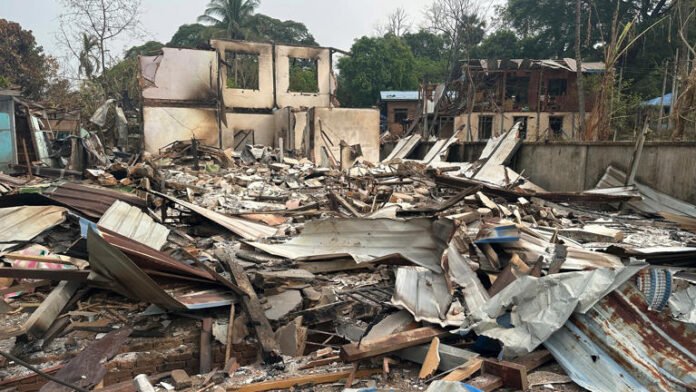Nearly 5,000 homes belonging to Buddhist and Hindu families have been destroyed in Myanmar. The fires, which swept through multiple villages in the western state of Rakhine, have left thousands of people homeless and deepened the already simmering ethnic and religious tensions in the region.
Local reports indicate that the arson attacks began late last week, rapidly engulfing residential areas. Eyewitnesses described scenes of chaos and panic as families fled their burning homes. “We lost everything in a matter of minutes,” said a Buddhist resident from a village near Sittwe, the state capital. “There was no time to save anything.”
The exact cause of the fires remains under investigation, but initial suspicions point to targeted attacks fueled by long-standing ethnic and religious animosities. Rakhine State has been a flashpoint for conflict between the majority Buddhist Rakhine population and the Muslim Rohingya minority, as well as other ethnic and religious groups, for decades. However, recent tensions have also seen clashes involving Buddhist and Hindu communities.
Humanitarian organizations and local authorities have rushed to provide relief to the displaced families. Temporary shelters have been set up, and emergency supplies are being distributed, but the scale of the destruction poses significant challenges. “The immediate needs are immense,” said a spokesperson for the International Red Cross in Myanmar. “Thousands are without basic necessities, and the risk of further violence looms large.”
The government of Myanmar has condemned the attacks and vowed to bring the perpetrators to justice. President Myint Swe, in a televised address, called for calm and urged all communities to cooperate with authorities to restore peace. “We must stand together against those who seek to divide us through violence and hatred,” he said. “The government will take all necessary measures to ensure the safety and security of all citizens.”
Despite these assurances, many residents remain fearful of further violence. The recent incidents have exacerbated the sense of insecurity that pervades much of Rakhine State. “We don’t know if it is safe to return to our village,” said a Hindu woman who fled with her three children. “There is no trust left between communities.”
International reaction to the crisis has been swift. The United Nations expressed deep concern over the escalating violence and urged the Myanmar government to take immediate action to protect vulnerable communities. “The destruction of homes and displacement of thousands of people is a severe humanitarian crisis,” said a statement from the UN Office for the Coordination of Humanitarian Affairs (OCHA). “We call on all parties to respect human rights and work towards a peaceful resolution.”
Human rights groups have also raised alarms about the potential for further atrocities. Amnesty International called for an independent investigation into the arson attacks and the underlying causes of the violence. “This tragic loss of homes and livelihoods is a direct result of the deep-seated divisions and discrimination that have plagued Rakhine State for years,” said an Amnesty spokesperson. “The international community must not turn a blind eye to these abuses.”
The broader implications of the violence in Rakhine are profound. Myanmar is still grappling with the aftermath of the military coup in 2021, which plunged the country into political and economic turmoil. The junta’s crackdown on dissent has led to widespread human rights abuses and has further inflamed ethnic and religious tensions across the country.
As Myanmar struggles to navigate this complex and volatile landscape, the need for comprehensive and inclusive dialogue among all ethnic and religious groups is more urgent than ever. Without meaningful efforts to address the root causes of conflict and promote reconciliation, the cycle of violence and retribution is likely to continue, with devastating consequences for all communities involved.
In the meantime, the immediate priority remains providing relief and support to those affected by the fires. Humanitarian agencies are calling for increased international aid to help rebuild homes and restore livelihoods. As one Buddhist monk in a makeshift camp near Sittwe put it, “We need peace, we need help, and we need hope for a better future.”

